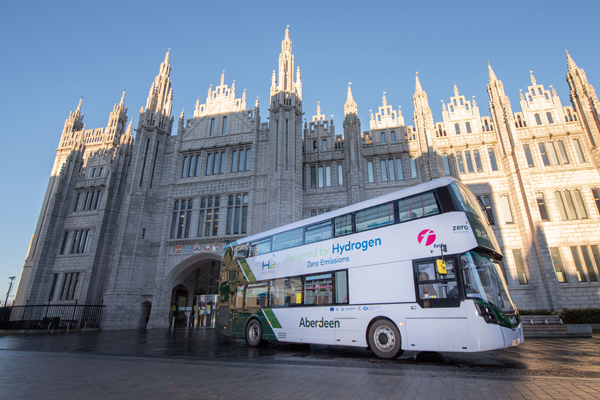Aberdeen has claimed a world first after a fleet of double-decker hydrogen buses officially launched into service on Thursday (28 January).
The buses, which cost about £500,000 per vehicle, were built by UK firm Wrightbus and will be operated by First Bus in a project led by the city council.
The zero-emission buses emit just water from their exhausts and the hydrogen itself is said to be obtained from ‘just wind and water’.
The £8.3m project has been funded by the city council, the Scottish Government, and the European Union (FCH JU).
City council co-leader Jenny Laing said: “It’s great to see the world’s first hydrogen double-decker buses starting on their service routes in Aberdeen.
‘The buses are a fantastic asset to the city as an entrepreneurial and technological leader as they have even more advanced technology which pushes established hydrogen boundaries and also greatly assist us in tackling air pollution in the city.’

One of the buses in front of Marischal College, headquarters of Aberdeen City Council
Wrightbus chairman, Jo Bamford, nephew of JCB chairman Lord Bamford, said it was a proud moment to see the buses in full operation for the first time.
He said: ‘Everyone at Wrightbus is incredibly proud to see the world’s-first hydrogen double-decker bus fleet in full service and carrying passengers around the streets of Aberdeen. It marks a pivotal moment in the city’s commitment to reaching net zero.
‘We will see further Wrightbus hydrogen buses in locations across the UK, with fleets due to launch in Birmingham and London later this year. It’s vital that other towns and cities sit up and take note of their example.
‘Hydrogen has an important part to play in the decarbonisation of transport and the reduction in CO2 levels that we need to reach to ensure a net zero future.’
The new 60-seat double-deckers are said to save one kilogram of CO2 with each kilometre they drive. They are also close to being silent and take less than 10 minutes to fully refuel.
The UK’s first hydrogen production and bus refuelling station was opened in Aberdeen in 2015 as part of a £19m city council-led green transport demonstration project that has tested the economic and environmental benefits of hydrogen transport technologies and aims to drive their development.
Plans are in place for Aberdeen to make its own hydrogen.
The Centre for Cities has previously highlighted Aberdeen's reliance on the oil and gas industry.
The vehicles are part-funded by the European Union’s JIVE project, which aims to aid commercialisation of hydrogen buses through joint procurement between cities.
Similar fleets are due to be launched in London and Birmingham later this year.
Register now for full access
Register just once to get unrestricted, real-time coverage of the issues and challenges facing UK transport and highways engineers.
Full website content includes the latest news, exclusive commentary from leading industry figures and detailed topical analysis of the highways, transportation, environment and place-shaping sectors.
Use the link below to register your details for full, free access.
Already a registered? Login